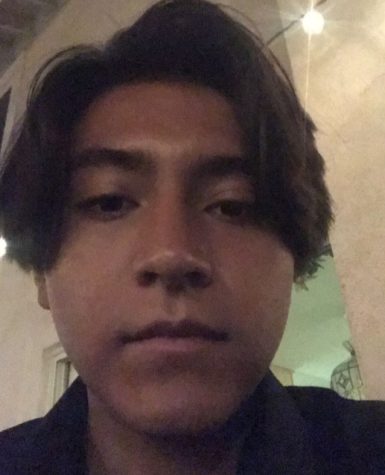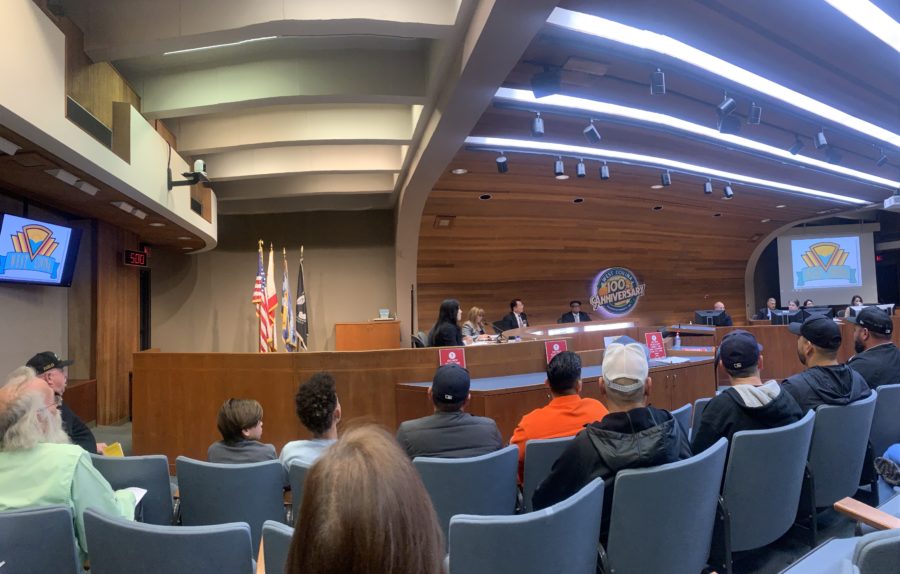West Covina Mayor Pro Tem Brian Tabatabai’s title in threat of being revoked
West Covina City Hall has seen no shortage of political theater in recent months. March 7’s meeting was no different.
The West Covina City Council convenes prior to the March 7 meeting.
West Covina City Hall has seen no shortage of political theater in recent months. March 7’s meeting was no different.
As the meeting came to its conclusion, things took an unexpected turn. Councilman Ollie Cantos motioned to add a vote to a future meeting agenda to revoke Mayor Pro Tem Brian Tabatabai’s title.
Earlier in the meeting, an invocation was done by Tribal Chairperson Andrew Salas, from the Gabrieleño Band of Mission Indians Tribal Government, Kizh Nation. The invocation was followed by a presentation summarizing the history of the Kizh nation, Salas’ lineage and their connections to the land that West Covina sits on today.
The motion by Cantos was promptly seconded by Councilwoman Letty Lopez-Viado, leading to the council voting 4-1 for the consideration. This vote means that the consideration to remove Tabatabai’s title will be added to the agenda at a future council meeting.
Due to the titles of mayor pro tem and mayor of West Covina being mostly ceremonial, the title rotates yearly among the sitting council members. If Tabatabai is removed from the position, Councilman Tony Wu would become mayor pro tem and Tabatabai would be moved to the bottom of the rotation. Crucially, Tabatabai would not be given the title of mayor, as he is next in line to take the role next year.
Tabatabai spoke to SACMedia following the meeting addressing these events.
“The motion to remove me is a deflection from what occurred at the centennial event, it’s a way to, again, refuse to be held accountable,” said Tabatabai.
“The council requested, the mayor, Councilman Wu, and then we all agreed to an investigation on what occurred, that investigation hasn’t taken place,” he continued.
“I think what it shows is that the call for an investigation was a farce, it was a strategy to possibly make the council members and the mayor look as if they had done nothing wrong, obviously, people saw through that,” Tabatabai said.
The 4-1 vote by the council comes after events surrounding the treatment of Gabrielino-Shoshone Nation representative and spiritual leader Jamie Nicole Rocha at the city’s centennial celebration on Feb. 18.
According to Rocha, she had been told that night by Wu and Mayor Rosario Diaz that reading a land acknowledgment would be “too political,” to which Rocha left the centennial celebration event in protest.
Wu and Diaz have disputed the telling of Rocha’s side of the story, both claiming that they were not properly informed by the city staff that Rocha and the Gabrielino-Shoshone Nation were to perform the land acknowledgment.
The following Tuesday, Feb. 21, the scheduled West Covina City Council meeting was fully in attendance after Rocha and her relatives expressed their anger and made calls to action on social media. By the time the meeting began, over 35 indigenous people and local residents in solidarity submitted speaker cards calling for Diaz and Wu to take accountability for their actions, many demanding they resign.
At March 7’s meeting, Cantos while announcing the motion to strip Tabatabai from mayor pro tem, described how the situation between the city of West Covina and the local indigenous tribes had been “weighing” on him.
In an interview with SACMedia, Cantos further explained why he made the motion, while also giving further context.
“First, by way of backdrop, this has been a pattern where the mayor pro tem has gotten everybody riled up, he organized people and then they come in to yell at everybody, ‘Racist, racist, resign,’ that kind of vitriol,” said Cantos.
Then Cantos described his and his colleagues’ position in the complicated tribal relations within West Covina and the San Gabriel Valley.
“On the day of the [Feb. 21] council meeting, we all got word from Chairman Andrew Salas, who is the chairman of the Kizh nation as recognized by AB 52, that, hey, that acknowledgment is important, but it needs to essentially be acknowledged as the right one,” said Cantos.
Salas, according to Cantos and other councilmembers contacted by him, in his contact with the West Covina councilmembers explained his tribe’s claim and their history of being acknowledged by the state of California. He would further explain the history of relations while giving a presentation to the public on March 7 at West Covina City Hall.
“No one speaks on behalf of this tribe, or this government, in the L.A. basin but us,” Salas said, speaking on his tribe’s name being used by those who spoke at the council meeting on Feb. 21.
Salas then went on to summarize briefly his position within the tribal politics and said, “Our tribe has been for thirty years, have experienced a great atrocity in this time, and that is people using our history to benefit themselves.”
“This term that has been going around, ‘Tongva’ has destroyed our culture, our history, our identity,’” Salas continued, bringing to light the complexities of tribal politics.
In an interview with SACMedia, Lopez-Viado, who seconded Cantos’ motion to remove the title of mayor pro tem from Tabatabai, spoke in a similar tone to her statements to Tabatabai at the meeting on Feb. 21.
Among those sentiments expressed, she mentioned the history of conflict between Tabatabai and the rest of the council.
“I just don’t like how a position or a title is being used for a certain type of agenda,” said Lopez-Viado.
“So that’s my second, but, it doesn’t mean it lessens him in any way at all, he still has the right to vote,” she continued.
Wu explained his decision in voting to consider stripping the title of mayor pro tem from Tabatabai while speaking with SACMedia.
“It’s a consideration, meaning, basically, we will find out at the next meeting,” he said.
“I think there’s a reason we want to get all the truths and as one city council, we will work together for the betterment of the city, not spread hate, not spreading any type of playing games, attacking your fellow councilman and the city for his personal political game, that is very, very uncalled for, it’s very sad and it’s really unacceptable,” Wu said.
Diaz also spoke with SACMedia, expressing her agreement with Cantos’ decision, while also assuring that a third-party investigation regarding the events at the centennial celebration will be conducted.
Addressing the political strife among the different indigenous tribes in the San Gabriel Valley, Rocha of the Gabrielino-Shoshone Nation returned to the podium.
“I’m not coming from a place of hate, I’m coming from a place of education, please don’t get that confused,” said Rocha, prefacing her statements.
“I know you saw a lot of craziness, a lot, a kind of insight of what many tribal groups go through, you know you have different groups and stuff like that, even though I am related, the Salas [family] are my cousins,” she continued.
“My family is buried at the San Gabriel Mission, where I have direct ties so I not only give my love to them, even though I identify as Gabrielino-Shoshone and they identify as Kizh, we got to remember, our nation is huge, we come from Catalina Island all the way to the mountains, so we’re not going to agree on a monolith name,” Rocha said.
In the aftermath of the 4-1 vote to remove Tabatabai’s title, the Gabrielino-Shoshone Nation posted to their Instagram and Facebook a message of support for the West Covina District 1 councilmember.
The West Covina City Council’s next meeting will be held on Tuesday, March 21, at 7 p.m. at West Covina City Hall.



